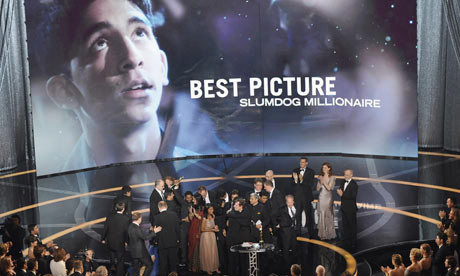
Arrived ... the cast and crew of Slumdog Millionaire celebrate their best film Oscar at the 2009 Academy Awards. Photograph: Mark J Terrill/AP
Slumdog Millionaire has won one of those extraordinary Oscar-night landslides: a film whose aura of success and feelgood word-of-mouth manages to replicate itself virally inside the heart and mind of every Academy Award voter.
It was the biggest British victory since Chariots of Fire and once again, the spirit of Colin Welland returned to gloat at the ceremony. The British always seem to be coming at the Oscars, but last night they really did arrive in force with a pumped-up, hyperactive, hyperreal melodrama set in south Asia with no stars other than a global TV franchise which everyone thought was past its sell-by date.
Already, the film's almost-straight-to-DVD production history has passed into legend. You could not, in Richard Littlejohn's famous phrase, make it up. It is a richly deserved victory for its likeable director Danny Boyle, whose acceptance speeches have melted hearts all over the place, and for its driving force, Film4's Tessa Ross, who is now fully entitled to luxuriate in her new status as Queen of Hollywood.
Oscarology is not an exact science and quite why it has done so spectacularly well is still a bit of a mystery to me, but the time has come for those, like me, who have treated the film with a touch of friendly scepticism to wake up to an important part of what made it so compelling: its differentness, its originality. At a time when consumers of commercial cinema are offered romcoms that look like all the other romcoms, thrillers that look like all the other thrillers, classy period dramas that look like all the other classy period dramas, Slumdog Millionaire really did deliver the shock of the new.
In addition, the 2009 Oscars gave a thoroughly welcome prize to Man On Wire, the extraordinary British documentary about Philippe Petit, the man who wire-walked New York's twin towers in 1974. This, I would venture to say, is the single best film to be honoured at last night's ceremony, and it can claim to have played a role in healing the wounds of 9/11.
The big surprise, of course, was Sean Penn, whose best actor award showed that Academy voters are prepared to reward old-fashioned technique: Penn's Harvey Milk was an elaborately, even brilliantly detailed impersonation of a gay man. (As with Brokeback Mountain, it may be the case that the Academy is prepared to welcome films about gay politics and gay sexuality, but not to the extent of giving them the best picture award.) Sean Penn really was Acting with a Capital A in 72-point bold.
Mickey Rourke, by contrast, was being himself: merging his established persona and reputation with a happily chosen piece of casting. Everyone, including me, thought that this was going to be the evening's sure thing. Even Kate Winslet wasn't as sure of her award as Mickey Rourke was of his. But it was not to be. Winslet herself got a well-deserved prize, though I can't help wishing that she had been awarded it for her performance in Revolutionary Road: a better performance in a far superior film.
Heath Ledger's posthumous Oscar was an event with a singular flavour: a tribute to his remarkable and deeply unnerving performance as the Joker in Christopher Nolan's The Dark Knight, now the fourth highest grossing movie in history. Ledger had pulled off the considerable triumph of effacing the memory of Jack Nicholson in the role. It was also a melancholy tribute to a lost talent: it was like a Curtailed Lifetime Achievement Award.






No comments:
Post a Comment